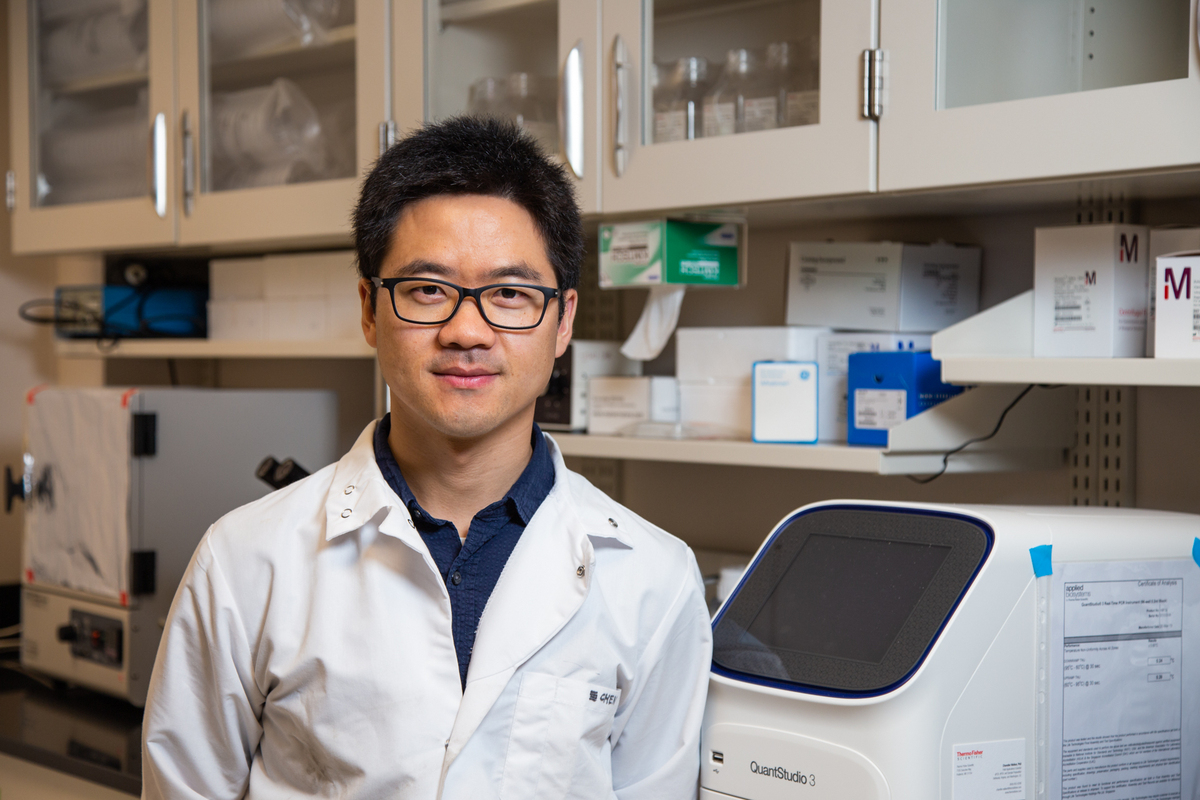KL2 Scholar alum earns $1.9M, 5-year NIH grant to study molecule with far-reaching implications

Guizhi “Julian” Zhu, Ph.D., a Wright Center KL2 Scholar alum and assistant professor in the VCU School of Pharmacy Department of Pharmaceutics, was awarded a five-year grant totaling $1.9 million to study a molecule with implications for the treatment of cancer, genetic diseases and more.
The award, which started on Sept. 18, will fund Zhu and his team’s work on three projects related to a single, multifunctional protein, the Adenosine Deaminases that act on RNA (ADAR).
The ADAR protein is an RNA editor, meaning it can change the transcription-level genetic information in a cell without permanently changing its genes. But it isn’t well understood, and the level of ADAR molecules in cells varies widely.
Zhu’s team seeks, first, to profile ADAR in various cells and disease tissues to better understand the variety.
“Looking at a tumor, for example, there is very high variability in the levels of ADAR proteins — in different types of tumors, but also in the same type of tumor among different patients,” said Zhu, who is also a research member at the VCU Center for Pharmaceutical Engineering and Sciences. “We want to develop a type of sensor to profile the level of this molecule.”
That’s the first step to leveraging the molecule for other uses, he adds.
The second project would be exploring the possibility of harnessing the editing function of the ADAR protein.
“We know this molecule can edit,” Zhu said. “What if we could use it to correct the genetic mutations that can cause diseases?”
That is the dream, but first the team will need to guide the ‘editor’ to the target — a difficult task, Zhu says. But one that his team has proposed multiple ways to accomplish.
If successful, the project could have implications for treatment of Factor V Leiden (FVL) thrombophilia, a type of blood disorder where patients have issues with blood clotting.
The third project will tackle inflammation, which is harmful for normal cells, but can be helpful in keeping a cancerous or diseased cell unhealthy. Inflammation can be caused by too much RNA in a cell, and studies have shown that, if ADAR is removed from the cell, the cell has less ability to remove the over-expressed RNA.
“So if we remove this molecule from cancer cells, it helps inhibit the function of this molecule in tumor cells and test whether or how much they can promote the standard treatment for melanoma — and maybe other cancers,” Zhu said.
Zhu’s award, the R35, is a coveted national award for the flexibility it provides a researcher. Whereas most national funding requires the proposal of a specific project with narrow aims, the R35 allows Zhu to switch projects and follow the data where it takes him.
“It’s a great opportunity for junior scientists like myself,” he said.
Zhu earned a KL2 Mentored Career Development Award from the Wright Center in 2018. The National Institutes of Health-funded award for early-career researchers gave Zhu protected time and funding for research. With the start of the R35 in September, Zhu graduated from the KL2 program.
“The KL2 was a great stepping stone to the R35, even though my KL2 project wasn’t directly related to the R35 project,” Zhu said. “There was a lot of indirect support and a systematic program that assisted my career development with broad impacts for my research.”
The KL2 Program at the Wright Center is supported by CTSA award No. KL2TR002648 from the National Center for Advancing Translational Sciences. Zhu’s R35 is supported by the National Institute of General Medical Services award No. R35GM143014.
Categories Clinical Research, Funding, KL2, Research, Translational Workforce Development